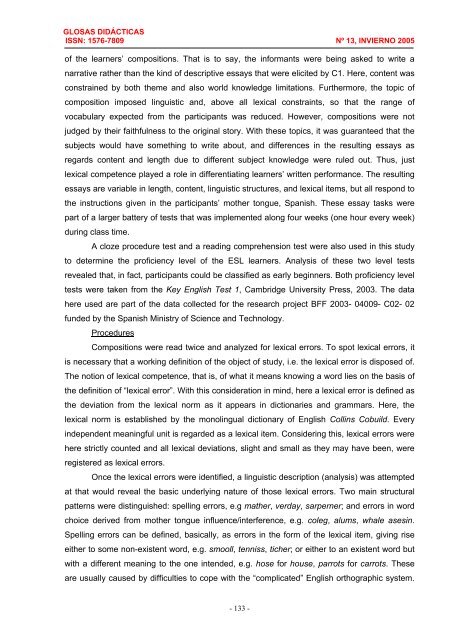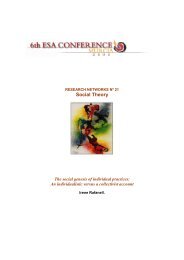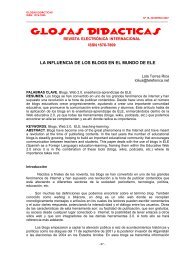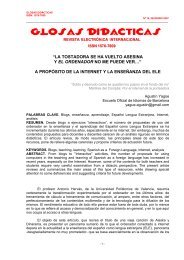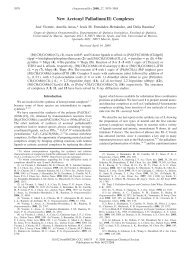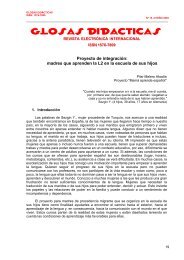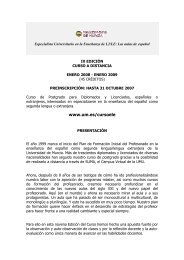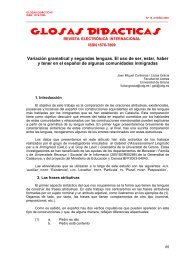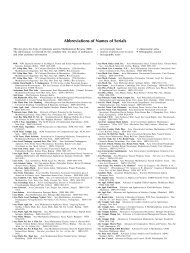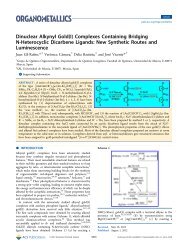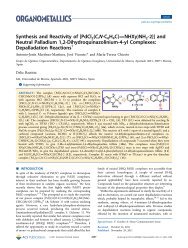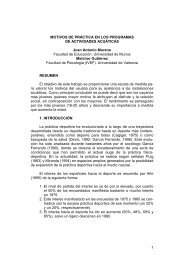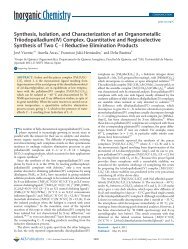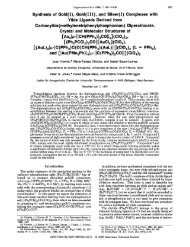descarga del número 13 de glosas didácticas completo
descarga del número 13 de glosas didácticas completo
descarga del número 13 de glosas didácticas completo
Create successful ePaper yourself
Turn your PDF publications into a flip-book with our unique Google optimized e-Paper software.
GLOSAS DIDÁCTICAS<br />
ISSN: 1576-7809 Nº <strong>13</strong>, INVIERNO 2005<br />
of the learners’ compositions. That is to say, the informants were being asked to write a<br />
narrative rather than the kind of <strong>de</strong>scriptive essays that were elicited by C1. Here, content was<br />
constrained by both theme and also world knowledge limitations. Furthermore, the topic of<br />
composition imposed linguistic and, above all lexical constraints, so that the range of<br />
vocabulary expected from the participants was reduced. However, compositions were not<br />
judged by their faithfulness to the original story. With these topics, it was guaranteed that the<br />
subjects would have something to write about, and differences in the resulting essays as<br />
regards content and length due to different subject knowledge were ruled out. Thus, just<br />
lexical competence played a role in differentiating learners’ written performance. The resulting<br />
essays are variable in length, content, linguistic structures, and lexical items, but all respond to<br />
the instructions given in the participants’ mother tongue, Spanish. These essay tasks were<br />
part of a larger battery of tests that was implemented along four weeks (one hour every week)<br />
during class time.<br />
A cloze procedure test and a reading comprehension test were also used in this study<br />
to <strong>de</strong>termine the proficiency level of the ESL learners. Analysis of these two level tests<br />
revealed that, in fact, participants could be classified as early beginners. Both proficiency level<br />
tests were taken from the Key English Test 1, Cambridge University Press, 2003. The data<br />
here used are part of the data collected for the research project BFF 2003- 04009- C02- 02<br />
fun<strong>de</strong>d by the Spanish Ministry of Science and Technology.<br />
Procedures<br />
Compositions were read twice and analyzed for lexical errors. To spot lexical errors, it<br />
is necessary that a working <strong>de</strong>finition of the object of study, i.e. the lexical error is disposed of.<br />
The notion of lexical competence, that is, of what it means knowing a word lies on the basis of<br />
the <strong>de</strong>finition of “lexical error”. With this consi<strong>de</strong>ration in mind, here a lexical error is <strong>de</strong>fined as<br />
the <strong>de</strong>viation from the lexical norm as it appears in dictionaries and grammars. Here, the<br />
lexical norm is established by the monolingual dictionary of English Collins Cobuild. Every<br />
in<strong>de</strong>pen<strong>de</strong>nt meaningful unit is regar<strong>de</strong>d as a lexical item. Consi<strong>de</strong>ring this, lexical errors were<br />
here strictly counted and all lexical <strong>de</strong>viations, slight and small as they may have been, were<br />
registered as lexical errors.<br />
Once the lexical errors were i<strong>de</strong>ntified, a linguistic <strong>de</strong>scription (analysis) was attempted<br />
at that would reveal the basic un<strong>de</strong>rlying nature of those lexical errors. Two main structural<br />
patterns were distinguished: spelling errors, e.g mather, verday, sarperner; and errors in word<br />
choice <strong>de</strong>rived from mother tongue influence/interference, e.g. coleg, alums, whale asesin.<br />
Spelling errors can be <strong>de</strong>fined, basically, as errors in the form of the lexical item, giving rise<br />
either to some non-existent word, e.g. smooll, tenniss, ticher; or either to an existent word but<br />
with a different meaning to the one inten<strong>de</strong>d, e.g. hose for house, parrots for carrots. These<br />
are usually caused by difficulties to cope with the “complicated” English orthographic system.<br />
- <strong>13</strong>3 -


